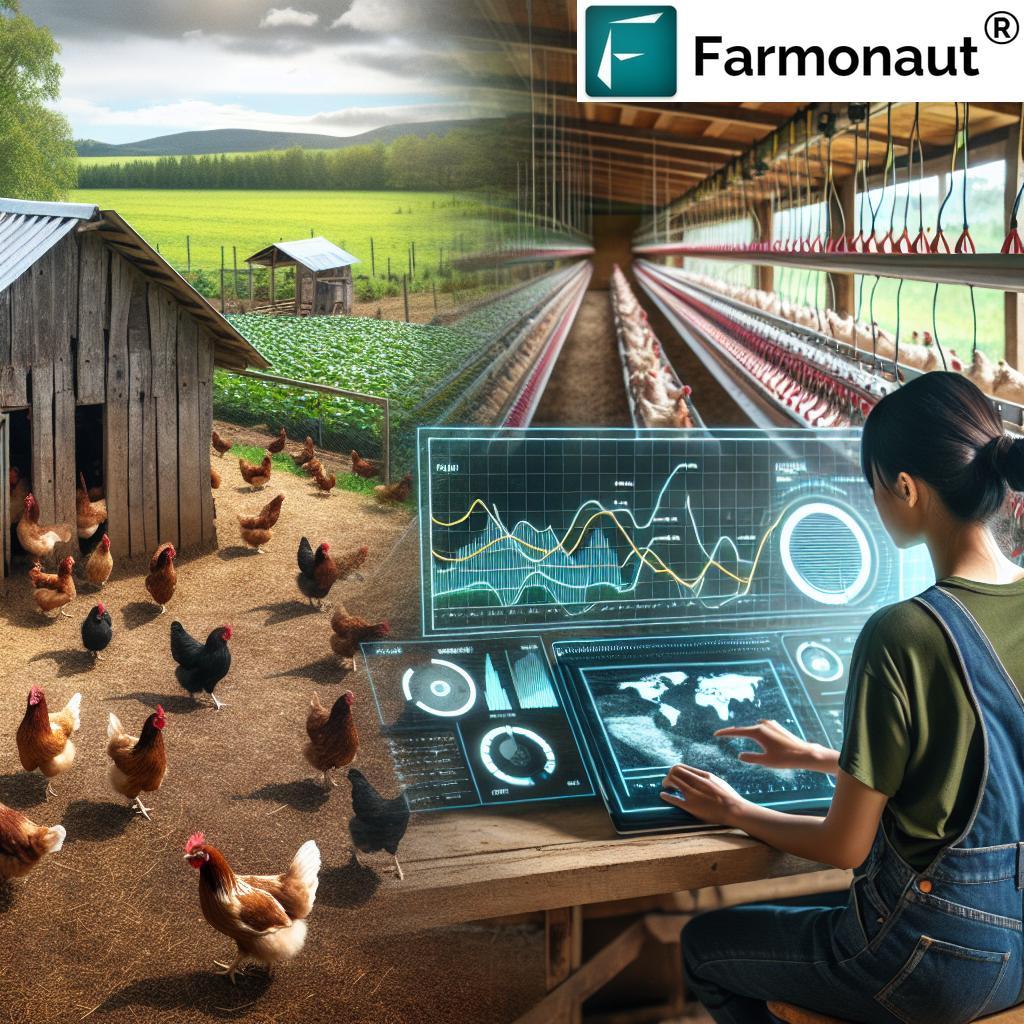Revolutionizing Ontario’s Small-Scale Poultry Farming: New Programs Boost Local Production and Sustainability
“Ontario’s new programs allow small-scale farmers to raise between 600 to 3,000 chickens annually under a licensed system.”
Welcome to our comprehensive exploration of the exciting developments in Ontario’s small-scale poultry farming sector. We’re thrilled to share insights into the new programs that are transforming the landscape for local chicken producers and driving sustainable agriculture practices across the province.
The Rise of Artisanal Chicken Production in Ontario
Ontario’s agricultural landscape is experiencing a significant shift, with small-scale chicken farming and artisanal chicken production at the forefront of this change. New initiatives are paving the way for local poultry market growth, addressing the increasing consumer demand for farm-to-table poultry products. These programs are not just about increasing production; they’re about fostering sustainable agriculture practices and supporting rural business development.

Let’s delve into the details of these transformative programs and explore how they’re reshaping Ontario’s poultry farming landscape.
New Horizons for Small-Scale Chicken Farmers
The heart of these new initiatives lies in the expanded opportunities for small-scale chicken farmers. Under the newly implemented license-based system, farmers can now raise between 600 to 3,000 birds annually. This significant increase in flock size opens up new avenues for growth and profitability for small-scale producers.
- Increased production capacity allows farmers to meet growing market demands
- Flexibility in flock size caters to diverse farm operations and market niches
- Enhanced economic opportunities for rural communities
This expansion is not just about numbers; it’s about empowering farmers to tap into niche markets and grow their businesses sustainably.
Sustainable Agriculture Practices in Poultry Farming
Sustainability is at the core of these new programs. By supporting local production, these initiatives are reducing the carbon footprint associated with long-distance transportation of poultry products. Moreover, they encourage farmers to adopt environmentally friendly practices in their operations.
- Promotion of organic feed usage
- Emphasis on humane animal care practices
- Encouragement of waste reduction and recycling in farm operations
These sustainable practices not only benefit the environment but also resonate with consumers who are increasingly conscious about the origin and production methods of their food.
Farm-to-Table Movement: Connecting Producers and Consumers
The farm-to-table movement is gaining momentum in Ontario, and these new poultry farming programs are playing a crucial role in this trend. By enabling local farmers to increase their production, the programs are creating a more robust supply of locally sourced chicken products.
- Direct marketing opportunities for farmers
- Increased availability of fresh, local poultry in markets and restaurants
- Enhanced consumer connection with food sources
This direct connection between producers and consumers not only ensures fresher products but also builds community support for local agriculture.
Navigating Poultry Farming Regulations
While these new programs offer exciting opportunities, they also come with a set of regulations that farmers must navigate. Compliance with food safety and animal care standards remains paramount. The programs provide guidance and support to help farmers meet these requirements effectively.
- Clear guidelines on flock management and health practices
- Regular inspections to ensure compliance with safety standards
- Support systems for farmers to implement best practices
Understanding and adhering to these regulations is crucial for the success and sustainability of small-scale poultry operations.
Agricultural Technology for Small Farms
The adoption of agricultural technology is a key component in the success of these new poultry farming initiatives. Small-scale farmers are increasingly turning to innovative solutions to optimize their operations and increase efficiency.
This is where Farmonaut’s precision agriculture solutions come into play. Our satellite-based farm management tools can significantly benefit small-scale poultry farmers by providing:
- Real-time weather data for optimal farm management
- Vegetation health monitoring for feed crop production
- Resource management tools for efficient farm operations
By leveraging these technologies, farmers can make data-driven decisions to enhance their productivity and sustainability.

Ontario Agricultural Programs: A Closer Look
The new programs supporting small-scale poultry farming in Ontario are part of a broader initiative to boost local agriculture. These programs offer a range of benefits and support mechanisms for farmers:
- Financial assistance for farm upgrades and expansions
- Training and education on best practices in poultry farming
- Marketing support to help farmers reach new customers
- Networking opportunities with other producers and industry experts
These comprehensive support systems are designed to ensure the long-term success and sustainability of small-scale poultry operations across the province.
Rural Business Development: Beyond the Farm
The impact of these new poultry farming programs extends beyond individual farms, contributing significantly to rural business development. By fostering growth in small-scale farming, these initiatives are creating ripple effects throughout rural economies:
- Increased demand for local suppliers and services
- Job creation in farming and related industries
- Boosted local economies through increased agricultural activity
- Enhanced community vitality and resilience
This holistic approach to rural development is crucial for the long-term sustainability of Ontario’s agricultural communities.

Poultry Farm Management: Best Practices
Effective poultry farm management is crucial for the success of small-scale operations. The new programs emphasize the importance of adopting best practices in various aspects of farm management:
- Flock health monitoring and disease prevention
- Optimal feed management and nutrition
- Efficient waste management and environmental stewardship
- Effective marketing and business planning
By focusing on these key areas, farmers can ensure the health of their flocks, the quality of their products, and the sustainability of their operations.
“Small-scale poultry farming in Ontario is growing, with farmers tapping into niche markets for locally sourced, artisanal chicken products.”
Challenges and Opportunities in Small-Scale Poultry Farming
While the new programs offer exciting opportunities, small-scale poultry farmers in Ontario also face challenges. Understanding these challenges is crucial for developing effective strategies to overcome them:
- Balancing production costs with market prices
- Meeting regulatory requirements while maintaining profitability
- Competing with larger, established poultry producers
- Adapting to changing consumer preferences and market trends
However, these challenges also present opportunities for innovation and differentiation in the market. Small-scale farmers can leverage their agility and direct consumer connections to create unique value propositions.
The Role of Technology in Modern Poultry Farming
Technology plays a pivotal role in modernizing small-scale poultry farming operations. From monitoring flock health to optimizing feed management, technological solutions are revolutionizing how farmers operate. Farmonaut’s precision agriculture tools can be particularly beneficial in this context:
- Satellite-based crop monitoring for feed production
- Weather forecasting for optimal farm management
- Resource management tools for efficient operations
By integrating these technologies, farmers can enhance their productivity, reduce costs, and improve the overall sustainability of their operations.
Explore Farmonaut’s API Solutions
Marketing Strategies for Small-Scale Poultry Producers
Effective marketing is crucial for the success of small-scale poultry farms. The new programs in Ontario provide support for marketing initiatives, but farmers can also implement their own strategies:
- Developing a strong brand identity focused on local, artisanal production
- Utilizing social media to connect with consumers and share farm stories
- Participating in farmers’ markets and local food events
- Collaborating with local restaurants and retailers
These marketing efforts help build a loyal customer base and differentiate small-scale producers in a competitive market.
The Future of Small-Scale Poultry Farming in Ontario
The future looks bright for small-scale poultry farming in Ontario. As these new programs take root and evolve, we can expect to see:
- Continued growth in local poultry production
- Increased diversity in poultry products and farming methods
- Greater integration of technology in farm operations
- Stronger connections between farmers and consumers
These trends point towards a more sustainable, diverse, and resilient poultry farming sector in Ontario.
Comparison of Ontario Small-Scale Poultry Farming Programs
| Program Name | Annual Bird Limit | License Requirements | Market Focus | Sustainability Features |
|---|---|---|---|---|
| Small Flock Program | 600 – 1,000 | Basic license | Local markets, direct sales | ✓ Encourages organic practices |
| Artisanal Chicken Program | 1,001 – 3,000 | Advanced license | Specialty markets, restaurants | ✓ Promotes sustainable feed practices |
| Farm Gate Sales Program | Up to 2,000 | Specialized license | On-farm sales, local events | ✓ Emphasizes animal welfare |
How Farmonaut Supports Small-Scale Poultry Farmers
At Farmonaut, we’re committed to supporting the success of small-scale poultry farmers in Ontario through our advanced agricultural technology solutions. Our platform offers several key benefits:
- Satellite-based crop monitoring for efficient feed production
- Weather forecasting to optimize farm operations
- Resource management tools for improved efficiency
- Data-driven insights for informed decision-making
By leveraging these tools, farmers can enhance their productivity, reduce costs, and improve the sustainability of their operations.
Download Farmonaut’s Android App


Conclusion: A Bright Future for Ontario’s Small-Scale Poultry Farming
The new programs supporting small-scale poultry farming in Ontario represent a significant step forward in the province’s agricultural landscape. By empowering farmers to expand their operations, adopt sustainable practices, and connect directly with consumers, these initiatives are fostering a more resilient and diverse poultry sector.
As we look to the future, the integration of advanced agricultural technologies, like those offered by Farmonaut, will play a crucial role in the continued success and sustainability of small-scale poultry farming. With the right support, tools, and strategies, Ontario’s small-scale poultry farmers are well-positioned to thrive in an evolving agricultural landscape, delivering high-quality, locally-sourced poultry products to meet growing consumer demand.
FAQ Section
Q: What are the main benefits of the new small-scale poultry farming programs in Ontario?
A: The programs allow farmers to raise between 600 to 3,000 birds annually, promote sustainable practices, support local market growth, and foster rural business development.
Q: How can technology benefit small-scale poultry farmers?
A: Technology like Farmonaut’s solutions can help with weather forecasting, resource management, and crop monitoring for feed production, leading to improved efficiency and productivity.
Q: What challenges do small-scale poultry farmers face in Ontario?
A: Challenges include balancing production costs with market prices, meeting regulatory requirements, competing with larger producers, and adapting to changing consumer preferences.
Q: How can small-scale poultry farmers market their products effectively?
A: Effective strategies include developing a strong brand identity, using social media, participating in local markets and food events, and collaborating with local restaurants and retailers.
Q: What sustainability features are emphasized in the new poultry farming programs?
A: The programs encourage organic practices, sustainable feed management, animal welfare, and environmentally friendly waste management techniques.



